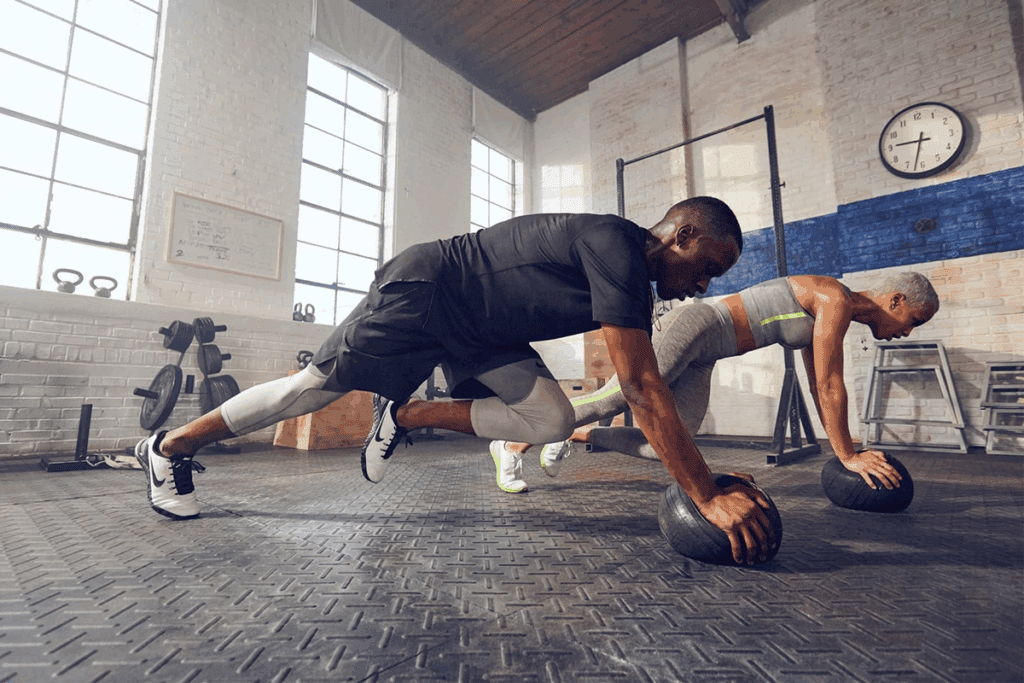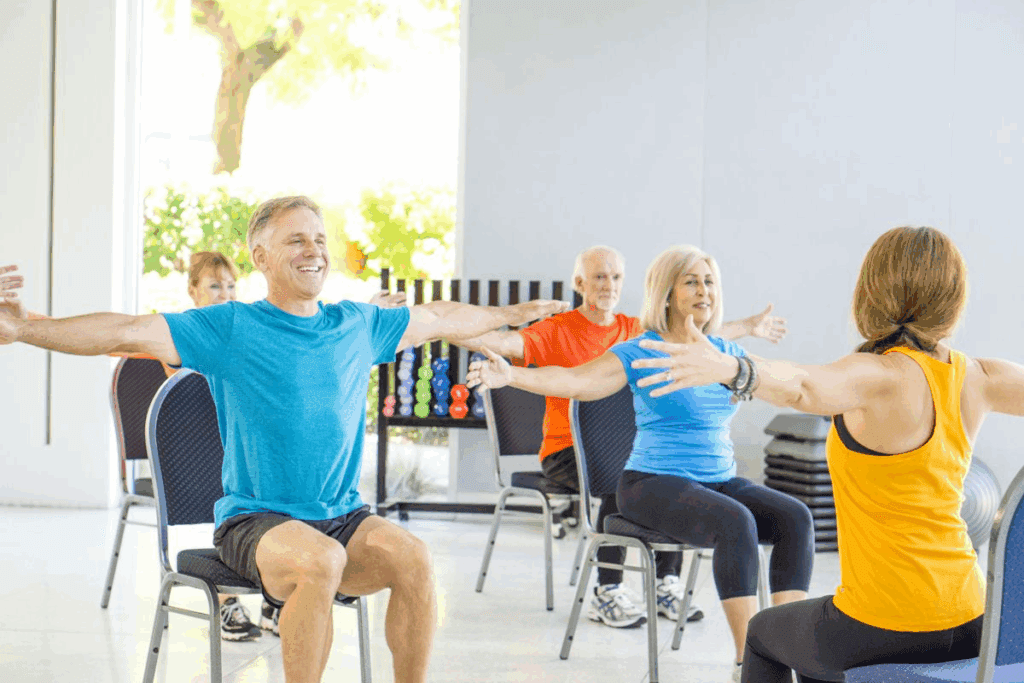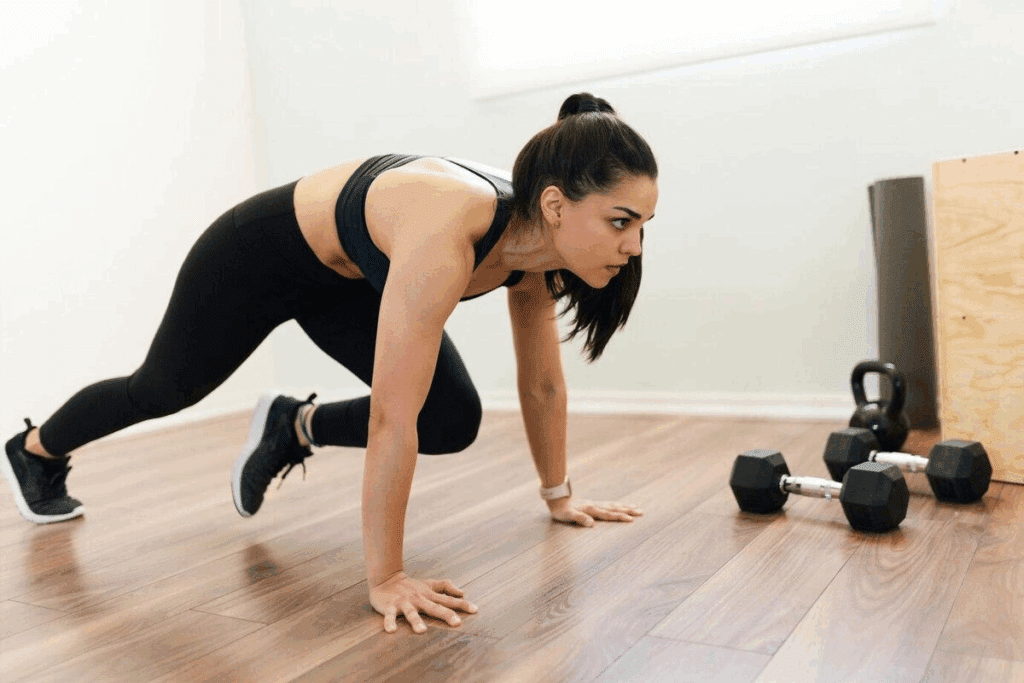Last Updated on November 25, 2025 by Ugurkan Demir

At Liv Hospital, we know how key effective cardio workouts are for losing fat and staying fit.cardiovascular exercises in the gymWhat is the best exercise for knee cartilage damage? These exercises are vital for a balanced fitness plan. They boost heart health, help with weight control, and improve overall well-being.
Studies highlight HIIT, treadmill running, and cycling as top choices for burning calories and losing fat. We’ll dive into the top 10 cardio exercises to help you reach your fitness targets. Our expertise and Liv Hospital’s focus on patient care back these recommendations.

To lose fat, knowing how cardio works is key. Cardio exercises boost our metabolic health and burn calories. They help our body use energy, leading to weight loss and better health.
Cardio exercises change how our body burns calories. Regular cardio boosts our resting metabolic rate (RMR). This means we burn more calories even when we’re not moving.
This boost comes from better mitochondria and more muscle. Good cardio routines help us lose fat for good.
Cardio helps us lose fat by burning more calories. When we do cardio, we use up energy from what we eat. First, we use stored glycogen, then fat.
The more intense and longer the workout, the more calories we burn. HIIT is great for burning fat fast.
Knowing how cardio affects our metabolism helps us choose the best workouts. This way, we can lose fat more effectively.

High-Intensity Interval Training (HIIT) is a top choice for losing fat and boosting heart health. It mixes short, intense workouts with brief breaks. This method is loved for its quick results and lasting fitness benefits.
HIIT is great for burning fat because it raises your metabolism and burns more calories. The intense workouts also trigger fat-burning hormones. Plus, HIIT helps your body better handle insulin, lowering the risk of diabetes.
Key Benefits:
Adding HIIT to your routine is easy. Here’s a simple yet effective workout:
| Exercise | High-Intensity Duration | Rest Duration | Repetitions |
| Sprinting | 30 seconds | 30 seconds | 5 |
| Burpees | 20 seconds | 40 seconds | 4 |
| Jump Squats | 30 seconds | 30 seconds | 4 |
| Mountain Climbers | 20 seconds | 40 seconds | 4 |
Adjust the intensity and rest periods based on your fitness level.
HIIT sessions should last 15 to 30 minutes, based on how hard you’re working and your fitness. Aim for 2-3 sessions a week, with breaks in between to recover.
HIIT can greatly improve your heart health and fat loss. Start slow and increase the intensity and frequency as you get fitter.
Treadmill running and sprinting are great for all fitness levels. They’re perfect for improving heart health and burning calories. They also help build muscle endurance.
There are two main ways to run on a treadmill: steady-state and interval training. Steady-state running keeps a constant pace for a long time. It’s great for building endurance, perfect for long-distance runners.
Interval training mixes high-intensity runs with rest periods. It’s super effective for losing weight and improving heart health. For example, sprinting for 30 seconds then walking for 1-2 minutes boosts your metabolism and burns calories.
Adding incline to your treadmill workouts can boost your results. Adjusting the incline targets different muscles and increases workout intensity. Incline training is great for strengthening legs and glutes, like uphill running.
To start incline training, set the treadmill to a 2-3% incline. Gradually increase it as you get used to it. Mix incline and flat running to keep your workout interesting and challenging.
Good running form is key for effective treadmill workouts and injury prevention. Keep your posture straight, engage your core, and land midfoot or forefoot. Avoid overstriding to protect your joints.
Get familiar with the treadmill controls to adjust speed and incline smoothly. Focus on proper form and technique for a safe and effective workout.
Cycling on a stationary bike or in a spin class is great for your heart and burns calories. It’s easy to adjust for all fitness levels. This makes it perfect for many people.
There are many cycling workouts to fit your goals and likes. These include:
These workouts keep cycling fun and challenging. They let you customize your routine to meet your goals.
Resistance training is key in cycling workouts. It lets you change the workout’s intensity. By adding more resistance, you can mimic uphill climbs and boost your strength and heart health. It’s important to adjust the resistance right to get the workout you want.
Cycling is great for burning calories. The amount you burn depends on how hard and long you cycle. A 30-minute ride can burn 200 to 400 calories. This makes it a good choice for losing or keeping weight.
| Workout Type | Intensity | Caloric Burn (30 minutes) |
| Steady-State | Moderate | 200-250 |
| HIIT | High | 300-400 |
| Endurance Ride | Low-Moderate | 150-200 |
Rowing machine workouts work many muscles at once. They are great for boosting heart health and building muscle. You can adjust the workout to fit your fitness level.
Rowing is a full-body workout that targets legs, core, and upper body. It’s effective for burning calories and building muscle. Regular rowing improves heart health, muscle tone, and overall fitness.
The rowing motion works major muscles like legs, glutes, back, and arms. It’s efficient for exercising multiple areas at once. This saves time and boosts workout effectiveness.
To maximize rowing benefits, proper technique is key. First, adjust the footrests to fit your feet. Then, sit up straight with knees bent and hold the handle correctly.
The rowing motion has three phases: catch, drive, and recovery. Start in the catch position with knees bent and arms extended. Then, push with legs, lean back, and pull the handle to your chest.
Interval rowing is great for losing fat. It alternates between intense rowing and easy recovery. A common interval workout is 20 seconds of hard rowing followed by 40 seconds of easy rowing, repeated for 15-20 minutes.
Interval training on a rowing machine burns calories during and after the workout. This is due to excess post-exercise oxygen consumption (EPOC).
Stair climbing and StairMaster training are great for a tough cardio workout. They boost heart health and strengthen the lower body. These exercises also help tone the legs and glutes, making them a top choice for a good workout.
Stair climbing and StairMaster training are top for toning the lower body. They work the quadriceps, hamstrings, glutes, and calves. This makes them a full leg workout. Plus, they offer big benefits for the heart, like better endurance and fitness.
Key benefits include:
To keep getting better, add intensity to your workouts. Try these methods:
Knowing how many calories different exercises burn helps plan your workouts. Here’s a look at the caloric burn for stair climbing and StairMaster compared to other cardio:
| Exercise | Calories Burned per 30 Minutes (approx.) |
| Stair Climbing | 400-500 |
| StairMaster Training | 450-550 |
| Treadmill Running | 300-600 |
| Cycling | 200-400 |
The table shows stair climbing and StairMaster training burn a lot of calories. They’re perfect for those wanting to lose weight or get fitter.
Elliptical machines are great for a low-impact cardio workout. They fit different fitness levels and goals. This makes them perfect for improving heart health without harming joints.
To make the most of your elliptical workout, customize it. Adjust the resistance and intensity. Increasing the resistance builds muscle endurance. Varying the intensity boosts heart health.
Set specific goals for your workout. Want better heart health or to burn calories? Tailor your elliptical workout to meet these goals. This way, you get the most out of your training.
Elliptical machines let you work out in two ways: forward and backward. Forward motion works the legs and glutes. Backward motion targets the hamstrings and glutes differently.
Mixing both motions keeps your workout interesting and effective. It ensures a balanced lower-body workout.
Most ellipticals have movable arms for a full-body workout. Incorporating arm movement burns more calories and works the upper body. This includes the arms, shoulders, and chest.
Keep proper form and engage your core. This boosts the workout’s effectiveness and prevents injuries.
By customizing your elliptical workout, using both forward and backward motions, and adding arm movement, you create a fun and effective low-impact cardio routine. It meets your fitness goals.
Jump rope training is a high-intensity cardio workout. It improves your heart health and muscle endurance. It’s great for all fitness levels, making it perfect for any gym routine.
Learning the basics of jump rope is key. Start by standing with your feet together and holding the handles. Rotate the rope with your wrists.
Once you get the hang of it, try more advanced moves. Double unders and high knees are great for improving your core and coordination.
Interval training with jump rope mixes high-intensity jumps with rest. Jump hard for 30 seconds, then rest for 30 seconds. Repeat this cycle.
“Interval training is a game-changer for cardiovascular fitness,” says a fitness expert. “It boosts your metabolism and keeps workouts fun and challenging.”
Jump rope is known for burning calories. A 10-minute session can burn 100-150 calories, depending on how hard you jump and your fitness level.
To burn more calories, add interval training and advanced moves to your routine. This boosts your heart health and muscle strength.
Jump rope is a fun way to improve your fitness and lose weight. It’s great for beginners and advanced athletes alike. Tailor your jump rope workouts to fit your goals.
Swimming and water workouts are great for your heart and don’t hurt your joints. They’re perfect for those who want to stay fit without the risk of injury. These activities are low-impact but pack a big punch for your heart.
Swimming has many strokes, each with its own perks. The front crawl boosts your heart health. The breaststroke works out many muscles at once.
The backstroke strengthens your back and improves your posture. The butterfly stroke is a full-body exercise that works your core, arms, and legs.
Mixing up your strokes can give you a well-rounded workout. It improves your heart health, muscle strength, and flexibility.
Adding water aerobics and resistance training to your routine is smart. Water aerobics is fun and great for your heart. It’s easy on your joints, unlike land-based exercises.
Resistance training in water helps build muscle. It uses the water’s resistance to strengthen your muscles. This way, you can get stronger without heavy weights.
Swimming and water workouts are low-impact, which is great for recovery. They’re perfect for people with injuries or chronic conditions. The water’s buoyancy reduces joint stress, allowing for intense workouts without harm.
These activities also aid in active recovery. They improve blood flow, reduce muscle soreness, and help you recover faster. This makes them ideal for athletes and anyone looking to stay fit without risking injury.
Mountain climbers are a dynamic and effective cardio exercise. They target multiple muscle groups and improve cardiovascular health. This exercise is great because it can be done anywhere without equipment, making it popular in gyms and at home.
Mountain climbers work your core, legs, and arms. They provide a full-body workout that boosts muscular endurance and cardiovascular fitness. It’s important to keep proper form and technique to get the most out of this exercise.
To do mountain climbers right, start in a plank position. Your hands should be shoulder-width apart, and your feet hip-width apart. Engage your core and keep a straight line from head to heels.
Bring one knee towards your chest, then the other, quickly. This mimics running. Keep your hips down and avoid letting your back arch or hips sag. This ensures the exercise is effective and safe.
To make mountain climbers harder, try different variations. Bring your knee towards the opposite elbow to work your obliques. This adds a challenge to your core. You can also do mountain climbers on a non-slip surface or with a towel under your feet to make it harder.
Try interval training by switching between high-intensity mountain climbers and rest. This boosts your cardiovascular fitness and muscular endurance.
Mountain climbers fit well into circuit training routines. Mix them with exercises like push-ups, squats, and lunges. This creates a workout that targets many muscle groups and improves heart health.
A sample circuit could be 30 seconds of mountain climbers, then 30 seconds of push-ups, followed by 30 seconds of rest. Repeat this for 15-20 minutes, adjusting as needed based on your fitness level.
Adding mountain climbers to your cardio routine makes your workouts more engaging and effective. It supports your fitness goals well.
Kickboxing and cardio combat classes are more than just fighting. They’re a full workout that boosts your heart health and overall well-being. These classes mix martial arts with aerobic exercise, making fitness fun and engaging.
In kickboxing and cardio combat classes, technique is key. Proper form and execution of kicks, punches, and moves are taught. This ensures a safe and effective workout.
Classes start with a warm-up and then teach basic techniques. They then move on to more complex combinations. This helps improve coordination and balance, boosting physical fitness.
Kickboxing and cardio combat classes work your whole body. They challenge both the upper and lower body, boosting strength, endurance, and flexibility. These high-intensity workouts also burn a lot of calories, helping with weight loss.
Kickboxing and cardio combat classes also offer mental and emotional benefits. The intense workout reduces stress and anxiety. It also improves mental clarity and overall well-being.
These classes provide a unique way to relieve stress. It’s not just about the physical workout. It’s also about the mental challenge and the sense of accomplishment.
Creating a good cardio routine is key for losing fat and reaching fitness goals. Knowing the benefits of different cardio exercises helps you make a routine that fits you. This way, you can enjoy your workouts more.
A well-planned cardio routine boosts heart health, burns calories, and improves muscle strength. We suggest mixing up your cardio with HIIT, treadmill running, and cycling. This variety keeps your workouts interesting and effective.
To lose fat, adjust the intensity and how often you work out. This lets you tailor your routine to your goals. Try out different exercises and levels to see what works best for you.
By following the tips in this article, you can make a cardio routine that helps you lose fat and get fit. A good cardio plan improves your health and makes you feel better overall.
The top cardio exercises at the gym are treadmill running, cycling, and rowing. Stair climbing, elliptical training, jump rope, and swimming are also great. They help improve heart health, burn calories, and build muscle endurance.
Pick one or two cardio exercises you like, like treadmill running or cycling. Decide how long and how often you’ll work out based on your goals and schedule. Adding High-Intensity Interval Training (HIIT) can boost calorie burn and heart health.
HIIT is a cardio workout with short, intense bursts followed by rest. It’s great for losing weight, improving insulin sensitivity, and heart health. You can use it with exercises like sprinting, cycling, or rowing.
Start by setting the treadmill’s incline and speed to challenge you. You can run steadily or try interval training by changing the speed and incline. Keeping good running form is key to avoid injury and get the best results.
Cycling is excellent for heart health, calorie burning, and building muscle. You can adjust the resistance to fit your fitness level. It’s also easy on the joints, making it good for those with joint problems.
Begin by adjusting the footrests and holding the handle correctly. Use your core, keep your back straight, and push with your legs. Avoid just using your arms to prevent poor form and injury.
Stair climbing boosts heart health, tones the legs, and burns calories. It also improves muscle endurance. You can use a StairMaster or real stairs for this exercise.
Adjust the resistance and incline on the elliptical to challenge yourself. Try moving forward and backward, and add arm movement to work your upper body.
Jump rope is fun and effective for heart health, calorie burning, and muscle building. It’s portable and can be done almost anywhere, making it a great workout addition.
Swimming is low-impact and improves heart health, burns calories, and builds muscle. Try different strokes like freestyle or breaststroke, and change your intensity to keep challenging yourself.
Kickboxing and cardio combat classes are engaging and improve heart health, burn calories, and build muscle. They also reduce stress and offer mental benefits, making them a great workout choice.
The frequency of cardio exercises varies based on your goals and schedule. Aim for three to four times a week, with at least one day of rest in between. Mixing up your cardio exercises can help avoid plateaus and prevent injuries.
Subscribe to our e-newsletter to stay informed about the latest innovations in the world of health and exclusive offers!